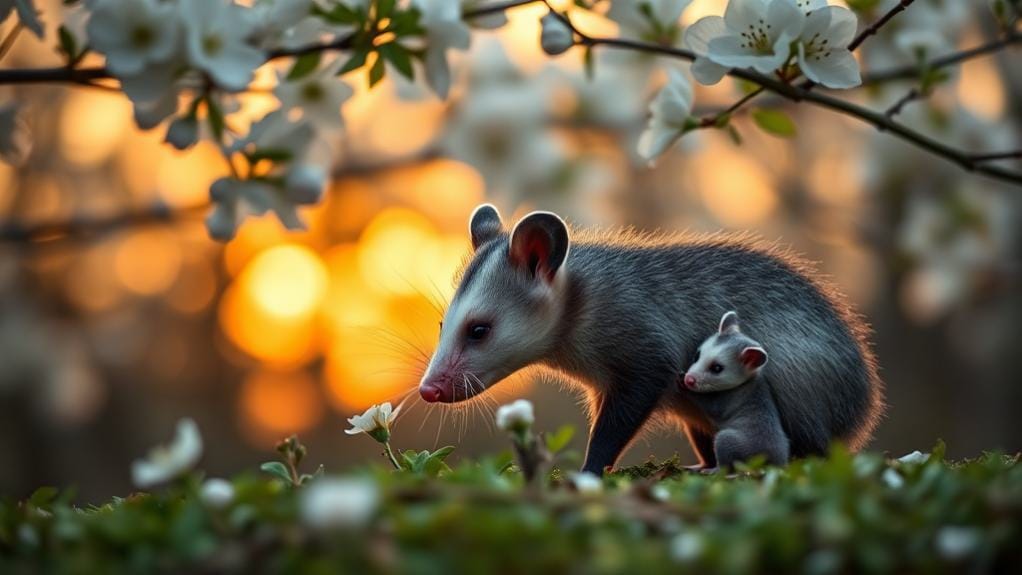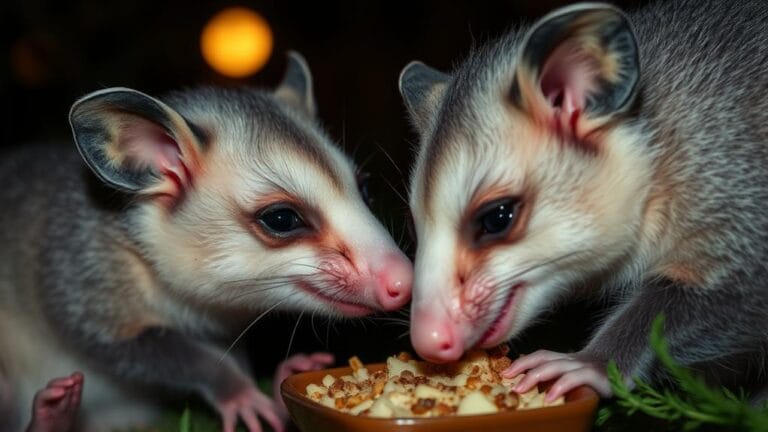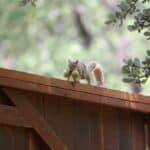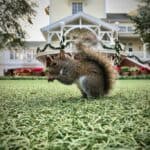Possums kick their activity into high gear during spring – and I'll tell you exactly why. These crafty critters are dealing with a perfect storm of breeding season, increased food availability, and warmer temperatures that make nighttime adventures more appealing. Female possums need extra calories to support their new litters, while males are on the prowl for mates. The seasonal warmth triggers more midnight snack runs, and you'll spot them raiding your garden thanks to the abundance of fresh insects and fruits. Their natural behavior patterns shift as they expand their territories and forage longer. There's way more to these springtime shenanigans than meets the eye.
Seasonal Changes and Possum Activity
Table of Contents
Nature's awakening in spring brings profound changes to opossum behavior and activity patterns.
You'll notice these normally nocturnal creatures getting bolder – sometimes even active during the day. Why? Because they're hungry and in love (well, as much as opossums can be).
As natural pest controllers, they're especially active hunting insects and rodents during this season.
Spring kicks off their breeding season, and let me tell you, it's a busy time.
Female opossums need extra food to feed their young opossums, while males are out there playing the field. They're not being dramatic – it's survival mode!
Pro Tip: If you're seeing opossums in your yard more often, it's probably because your garden's becoming an all-you-can-eat buffet for these hungry marsupials.
The warmer temperatures make it perfect for them to forage longer and more frequently.
Trust me, they're not just hanging around your yard for the scenery!
Breeding and Territory Expansion
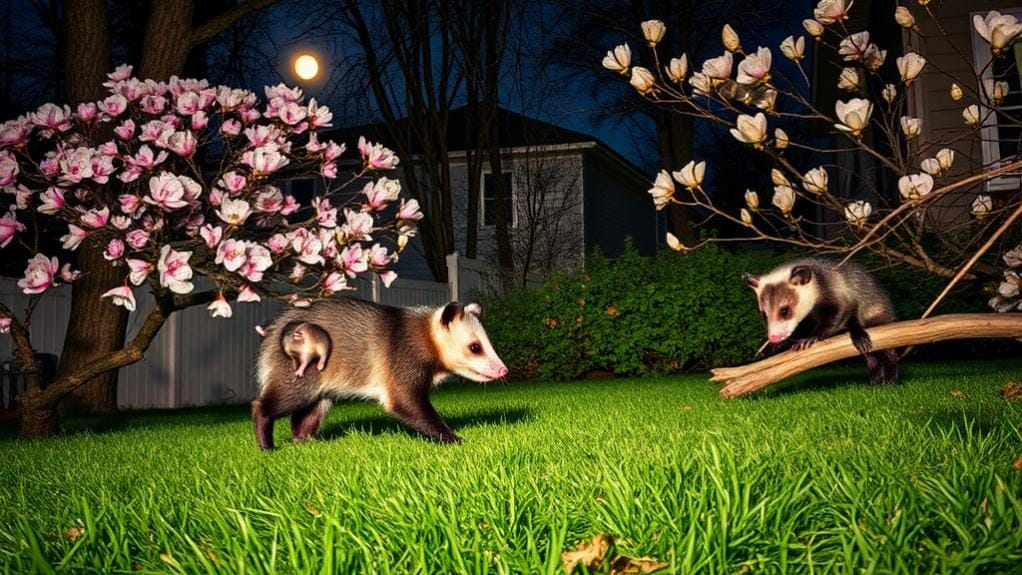
During spring, opossums enter their most active breeding period, transforming their usual routines into a complex dance of survival and reproduction.
While they're generally disease-resistant creatures, spring activity increases their interactions with humans and pets. I've noticed males get particularly restless – they're basically speed-dating their way through expanded territories while females are busy playing the real estate game to find perfect nursery spots.
You'll spot these crafty creatures more often during daylight hours. Why? Because breeding season means everyone's got to step up their food game.
Females need extra calories to support their upcoming litters (up to three per year – talk about ambitious!), while males are burning through energy searching for mates.
*Pro tip: If you're seeing more opossums in your yard this spring, don't panic. They're just doing their annual territory expansion thing, following their nose to the best food sources around.*
Food Sources in Spring
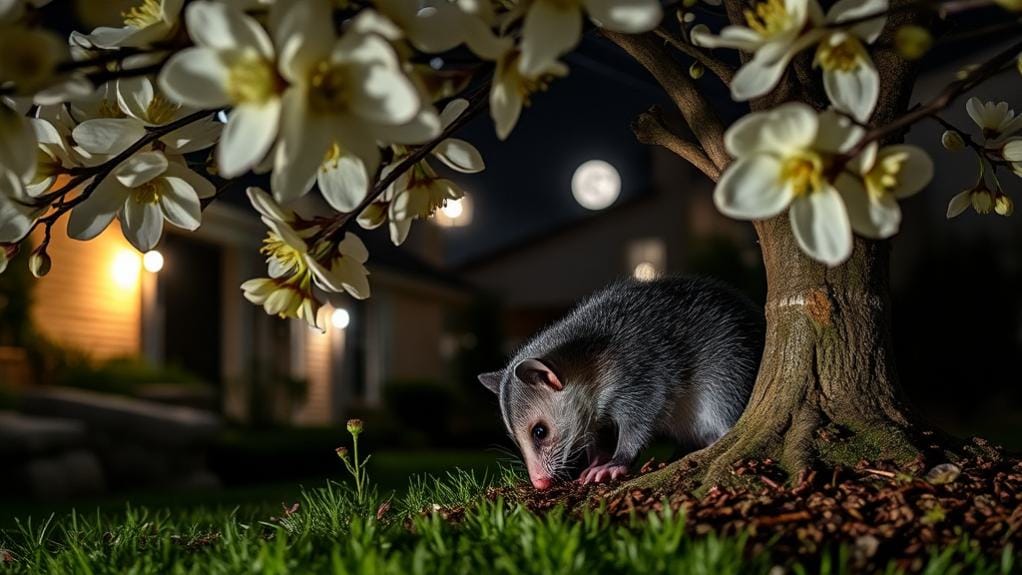
Spring's bounty transforms the possum's menu into a diverse feast of fresh options.
I'll tell you why these clever omnivores are hitting the all-you-can-eat buffet in your backyard right now.
Let's face it – spring is like Black Friday for possums. The abundance of fresh food sources means they're out there foraging like there's no tomorrow.
While natural deterrent plants can help protect your garden, springtime presents extra challenges. And guess what? Your garden's probably on their shopping list.
Here's what's drawing them in:
- Fresh fruits falling from trees (yep, free produce!)
- Insects coming out of winter hiding
- Your perfectly maintained compost bin (it's basically a possum restaurant)
*Pro tip: Females need extra food in spring for their babies, so don't be surprised if you spot them raiding your garden more often. They're not being greedy – they're just being moms.*
Weather Impact on Movement
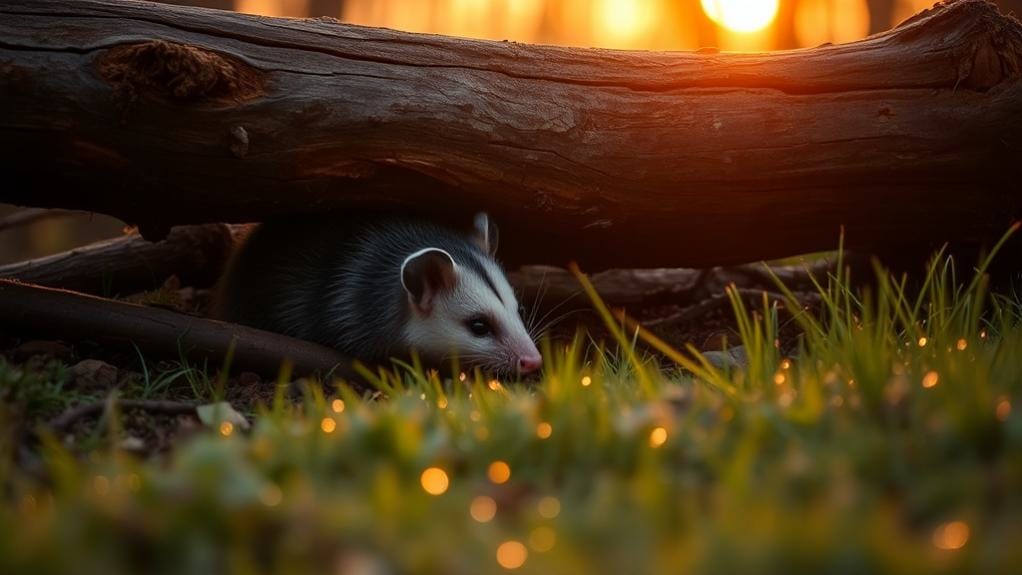
Warmer days kick our nocturnal neighbors into high gear, transforming their typically cautious movements into a flurry of activity.
You'll notice the Virginia opossum doesn't exactly follow your schedule – these critters are most active when you're getting ready for bed.
Sealing entry points around your home becomes especially important during this active season, as possums seek new spaces to explore.
Here's what's really going on: As spring temperatures rise, these weird little marsupials don't need to huddle up for warmth anymore. That means more time searching for midnight snacks!
The weather conditions practically throw them a party, and trust me, they're RSVPing with enthusiasm.
*Pro tip: If you're trying to avoid these nighttime wanderers, you might want to secure your garbage cans. They're making up for lost time before those brutal summer months hit, and they'll raid any food source they can find.*
Natural Habitat Preferences
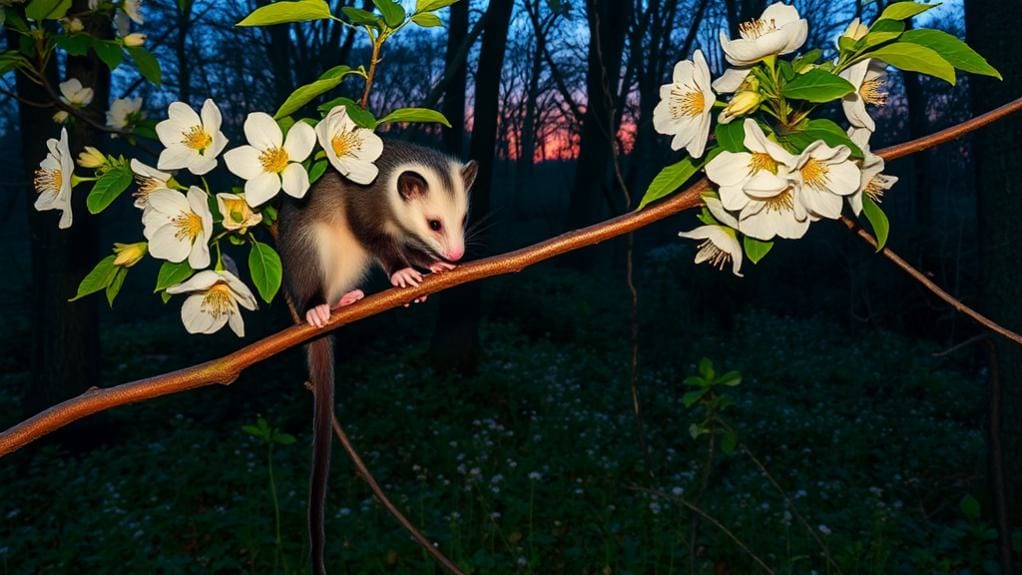
These fascinating creatures don't just wander aimlessly – they've got a clear idea of their perfect home setup. Virginia opossum habitat preferences are pretty specific, and I'll tell you why that matters in spring and summer.
When seeking shelter, they often target attic spaces for warmth and protection from predators.
You'll find opossums are often hanging out in these prime locations:
- Wooded areas with lots of hiding spots (because who doesn't love a good secret hideout?)
- Farmlands and suburban areas near your veggie garden (yep, they're not shy)
- Areas with abandoned burrows and hollow trees (free real estate, anyone?)
Let's be real – these clever creatures know exactly where to forage for food.
Their natural habitat preferences aren't random – they're strategic. They'll pick spots close to water, dense vegetation, and yes, even your backyard if it offers good shelter and snacks.
Daytime Vs Nighttime Behaviors
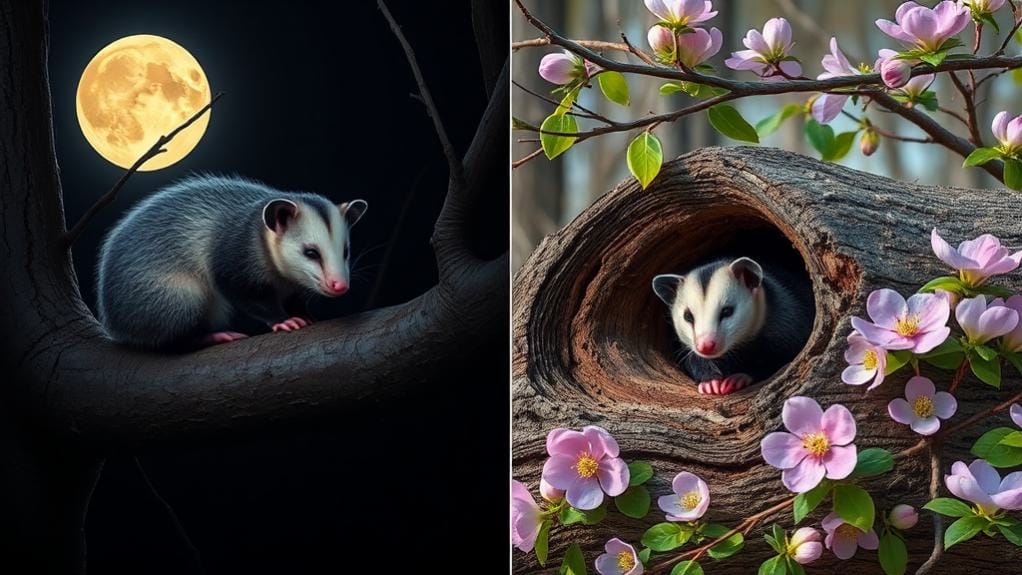
Out in the wild, opossums lead distinctly different lives between day and night.
I'll let you in on a secret – these sneaky little creatures aren't big fans of sunbathing. They're total night owls, doing their best work between 11 PM and 2 AM.
But here's where it gets interesting. Spring shakes things up big time. You'll spot more daytime activity when mama opossums need extra food for their young.
And those bachelor opossums? They'll throw caution to the wind and venture out during daylight hours searching for love during breeding season.
*Pro tip: If you see an opossum during the day, don't panic! It's probably just a hungry parent or a lovesick male doing what nature demands. Unless it's acting weird – then keep your distance.*
Protection From Spring Predators
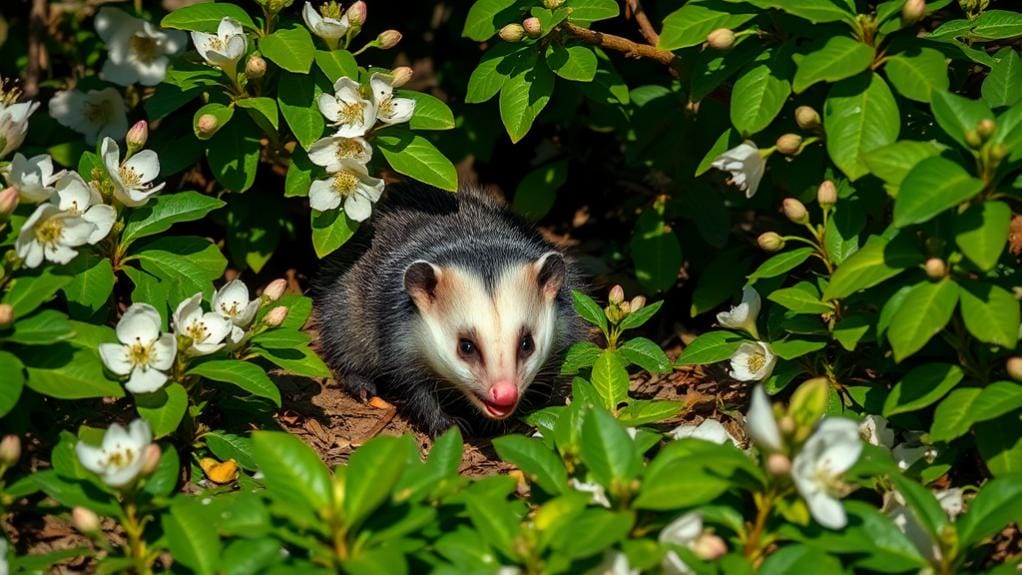
During spring's breeding season, I've noticed opossums face a tricky balance between survival and parenthood. The Virginia opossum isn't just wandering around for fun – they're active at night when young are born because that's their best shot at avoiding predators.
Let me tell you why these clever creatures have amazing protection from spring predators:
- Their low body temperature makes them practically immune to rabies (take that, predators!)
- They can escape ground threats by climbing trees with those awesome prehensile tails
- They're smart enough to avoid contact with humans and daytime predators by staying nocturnal
You'll rarely spot these nighttime ninjas during the day, and there's a good reason. When mama opossum has babies to protect, she's not taking any chances with owls, bobcats, or your neighbor's overly curious cat.
Frequently Asked Questions
What Month Are Possums Most Active?
I've observed that opossums are most active in May when breeding season peaks and mothers emerge with their young. They're especially busy foraging for food during nighttime hours to feed their growing families.
Do Possums Come Out in Spring?
You might think possums hide year-round, but I can tell you they're definitely out in spring! I see them frequently during this season as they actively breed, forage for food, and care for their babies.
What Does It Mean When a Possum Is Out in the Daytime?
If I spot a possum during daytime, it's likely searching for food, especially if it's breeding season. While it's unusual, it's not always cause for concern – they're rarely rabid due to their low body temperature.
Why Do Possums Keep Coming in My Yard?
Envision this: your yard's a buffet for hungry possums! I bet you've got tasty fruits, gardens, or unsecured trash that's attracting them. They're simply following their nose to an easy meal in your space.
Last Word
Think of possums like teenagers during spring break – they're suddenly everywhere and eating everything in sight! I've noticed these nocturnal wanderers get super active once winter fades, probably because they're following their basic instincts: mate, eat, and claim territory. You'll spot them more often now, especially at dawn and dusk. Just remember, they're as startled by you as you are by them. Let them do their springtime thing – they're actually helping keep your garden pest-free.

